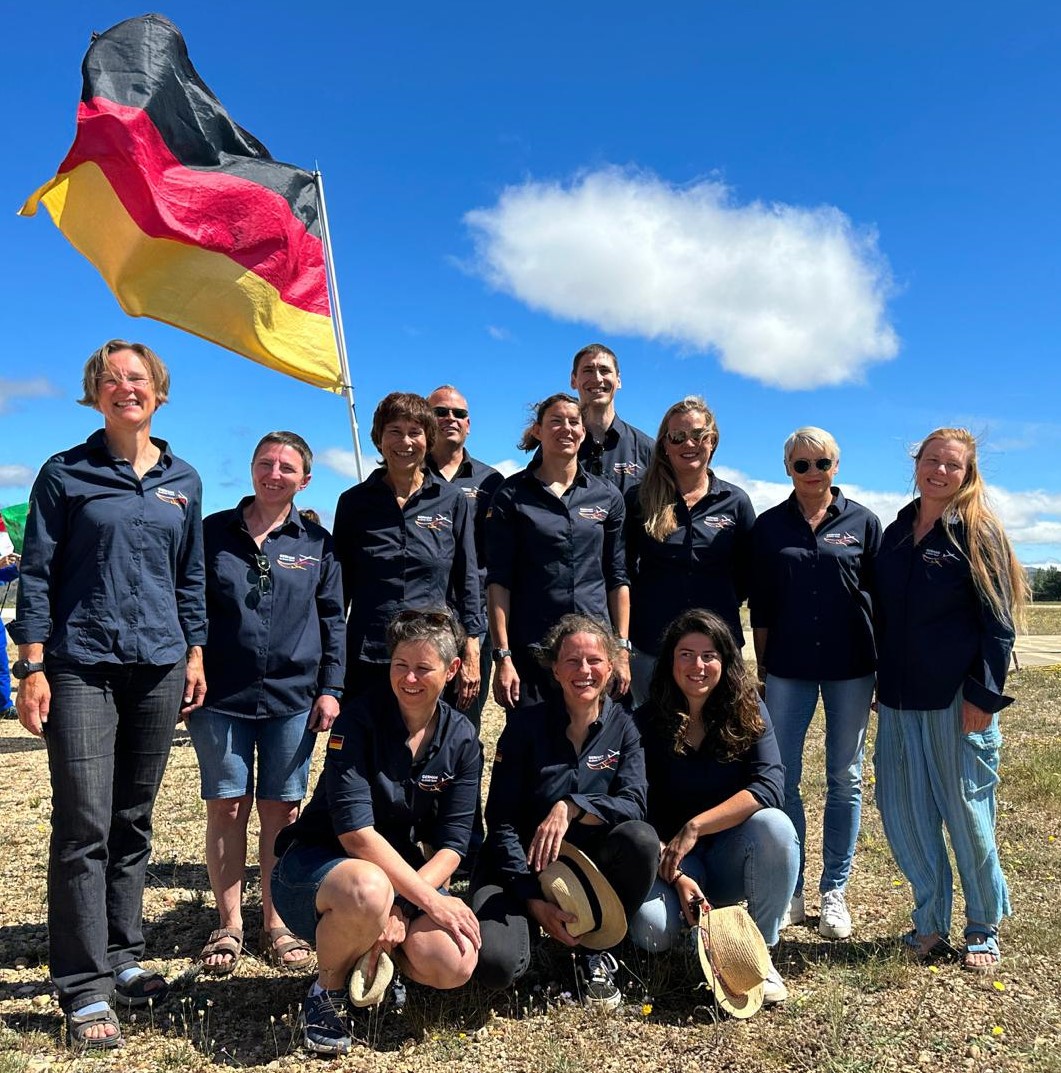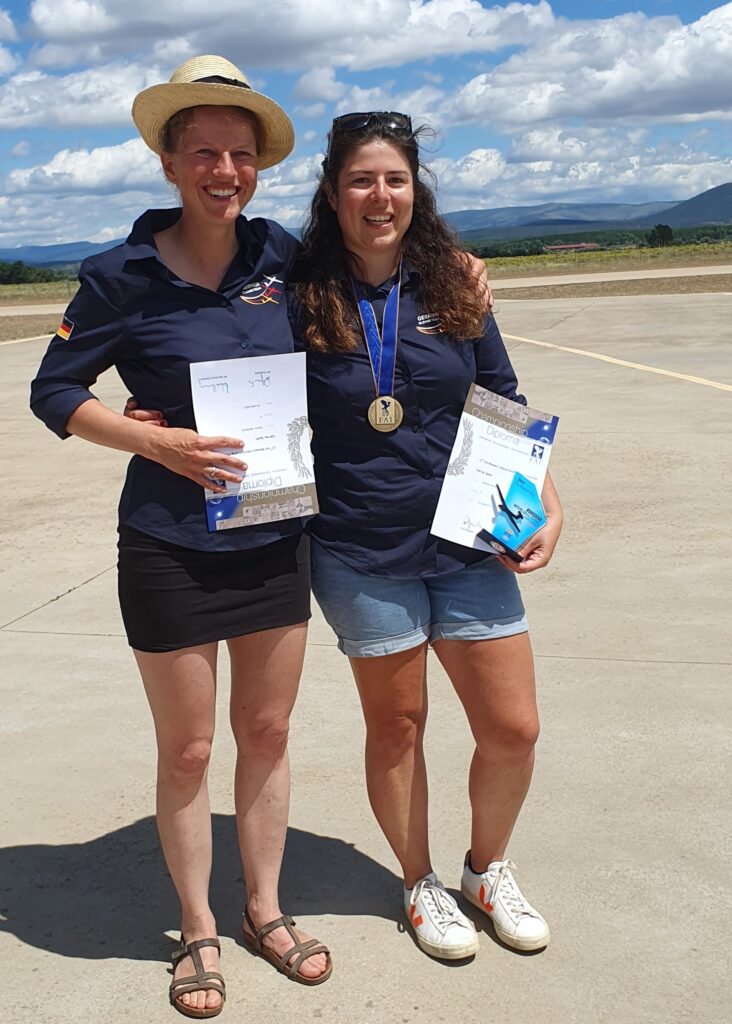Jena (Germany) | August 21, 2023
Bonding without glue and flying without engine
Faces of Fraunhofer IOF: Dr. Carolin Rothhardt is a glider pilot and conducts research at Fraunhofer IOF on bonding technologies e.g. used for space or quantum, among others.
Carolin Rothhardt likes to push »the maximum« – whether in the development of optical bonding technologies for use under extreme conditions or in flying without an engine. In July, the scientist and German gliding champion competed in the Women's World Championships in Soria, Spain.
"Do you see those little fleecy clouds up there in the sky? They're ideal for gliding, because there's a lot of thermal updraft underneath," explains Carolin Rothhardt, looking up at the sky from her office window at Fraunhofer IOF. The PhD material scientist has already been working up here at the Beutenberg Campus since 2018, and since 2022 as group leader for bonding technologies in the Department of Precision Optical Components and Systems. Bonding technologies - that means that Carolin and her team are researching methods that allow optical components to be bonded together without additional help, such as adhesives. "I call it bonding without glue," the scientist explains with a laugh.
And just as Carolin can bond without glue, she can fly without an engine. Born in Jena, she has been a passionate glider pilot and committed participant in a wide range of competitions since her early youth. And with great success: She has already taken part in the German Championships a total of six times. In 2022, she won the championship title and thus qualified for the Women's World Championships in cross-country gliding, which this year took place in Soria, Spain, from July 1 to 15, and in which Carolin took fifth place in the so-called "club class."
When researcher and technology lift of
The remarkable parallel here is that just as Carolin herself likes to reach lofty heights, so do the technologies she develops at Fraunhofer IOF. Her bonding technologie is used, for example, in the manufacture of spectrometers, which are used in space research. Spectrometers can be used to analyze the composition and properties of certain substances.
One current project Rothhardt and her group are working on is the CO2M mission. Led by the European Space Agency, the mission will in 2024 launch a satellite that will monitor our planet's greenhouse gas emissions. For CO2M, Carolin and her team at Fraunhofer IOF have connected a prism with a grating and thus realized an optical subcomponent for the spectrometer used in the satellite for climate monitoring.
But even very "down-to-earth" projects are supported by the bonding technologie: For example, Carolin's team is also involved in research around the first quantum computer made in Jena and thus the high-performance computers of the next generation. Because Carolin likes to "push the limits", as she says herself - whether in sports or in the development of the latest future technologies.
A special view on climate change
Especially through her work on projects from climate research, the Fraunhofer scientist is thereby looking for solutions to problems that she can observe from a very special perspective, especially as a glider pilot. "When you fly over the Thuringian Forest and you can see the extent of the forest dieback from above there - that's quite depressing," says the athlete. But it's not just Germany's former green heart that she can watch slowly turning gray. On previous trips to the skies above Spain, Carolin has also been able to observe the devastating extent of forest fires from an aerial perspective.
Yet it is precisely the beauty and peculiarity of nature that makes her so enthusiastic about the sport of gliding: "The first time you take advantage of certain weather phenomena - for example, utilizing the thermal updraft caused by solar radiation or the wind that is thrown back from a slope and propels you upward - that is a very special feeling," Carolin enthuses.

Women still underrepresented in STEM as well as in gliding sport
A very special feeling that is still mostly enjoyed by men. Because as Carolin notes, the sport of gliding, just like science, is still male-dominated to this day: "When I first took part in the junior championships, I was surprised to find that the participants were almost exclusively young men - even though the championships were open to both girls and boys. To this day, the percentage of female glider pilots is quite low."
In Carolin's case, too, it was her father, himself an enthusiastic glider pilot, who first took her to the airfield in Jena-Schöngleina and thus ignited the spark for her later passion. The sport does require a certain interest in technology, Carolin explains, "but in the end it's not much different than driving a car." She herself began her training as a glider pilot at the age of 14. Three years later, she got her license. "I was a full-fledged glider pilot before I had my driver's license," she recalls with a laugh in her voice.
But the fact that Carolin is a real wholehearted scientist anyway can be seen from the fact that she can't get out of her skin and emphasizes simultaneously not only the impressive experience of nature but also the technical fascination of gliding: "The realization that you fly completely without direct propulsion, just with the power of nature, and that you can cover huge distances and push the maximum in this way - that's what I find so fascinating," she says enthusiastically. It's a fascination she shares with her husband, much like her professional vocation in science: Dr. Jan Rothhardt researches laser technology at the Institute of Applied Physics at the University of Jena and is also an award-winning glider pilot. In 2016, he won the title at the world championships in Lithuania.
Teamwork in the Spanish sky
Now in 2023, Carolin was able to compete with the world's best in her sport at the World Championships in Soria, Spain: "At the World Championships, the flying tasks were very demanding. In some cases, you had to fly very low under the forbidden airspace to complete the tasks set in the competition," she reports. "For the most part, my team partner Daniela Wilden and I succeeded very well." On three of the eight days, the team was among the three best on each day. At the beginning of the penultimate day, they were in second and third place. "Unfortunately, we then took too much risk and I lost my podium position," she adds. "Daniela held on to third place." Carolin herself took fifth place in the end. "With that, we kept our previously set goal of reaching the top five," she says. "It was also made possible by our wonderful crew in the background. We had several helpers who assisted us in preparing the planes or doing minor repairs. Two team coaches continued to provide tactical and strategic support on the ground," Carolin reports in appreciation of her crew.
But it wasn't just the people and the sport that made the World Cup an unforgettable experience for the researcher from Jena: "Particularly memorable for me were also the encounters with the local wildlife, especially the griffon vultures," she reports. "There are also many birds in Germany, and there are species that can use thermal updrafts better than others. On one competition day, a griffon vulture indicated a particularly good thermal updraft to us while we were flying. Afterwards, we circled with him," Carolin recalls. "Such unforgettable moments are particularly memorable."
"Looking back, it was a great debut at the World Championships," says the ambitious athlete, summing up her first participation in a World Championship. The German championships are coming up again next year - "and of course I want to qualify for the World Championships again," says Carolin with quite a dose of ambition in her voice.
The Institute is already keeping its fingers firmly crossed for this and congratulates above all on a successful start at the 2023 World Cup!
Qualification for the 2025 World Gliding Championships
Carolin Rothhardt continues her successful career in both science and gliding. At the German Gliding Championships in Neustadt at the beginning of August, she won the silver medal, securing her qualification for the 2025 World Championships in Zbraslavice, Czech Republic. Despite challenging weather conditions, she and her team partner Daniela Wilden were able to clearly pull away from the field on the decisive fourth day of the competition and take the win.
In mid-September, she was awarded the prestigious WLT prize for her work on innovative bonding technologies for high-performance lasers.
Passion for light - that is Fraunhofer IOF. Innovative solutions for light-based future technologies are developed here. But who are the people behind research and science? In the series "Faces of Fraunhofer IOF" we introduce them.







